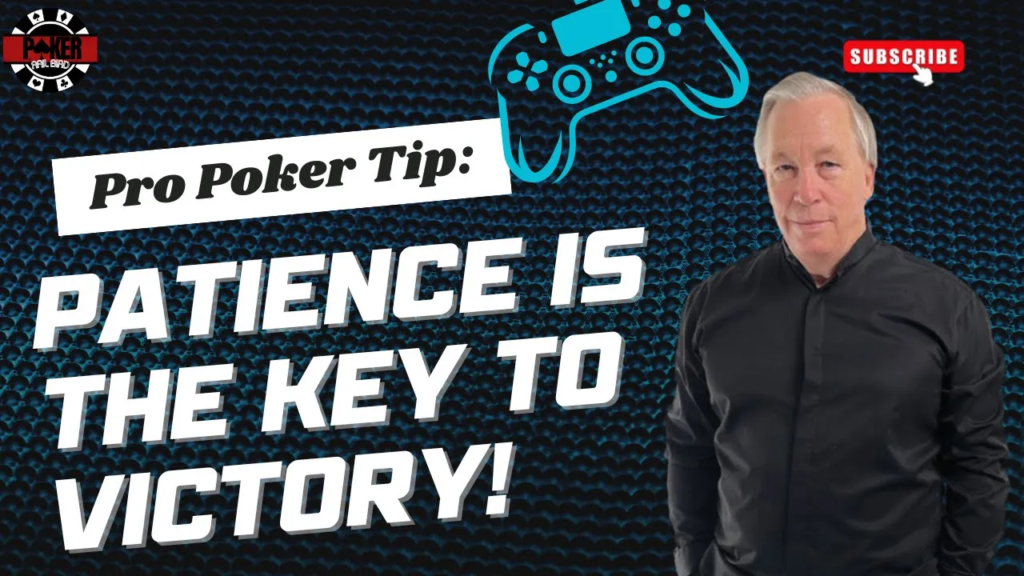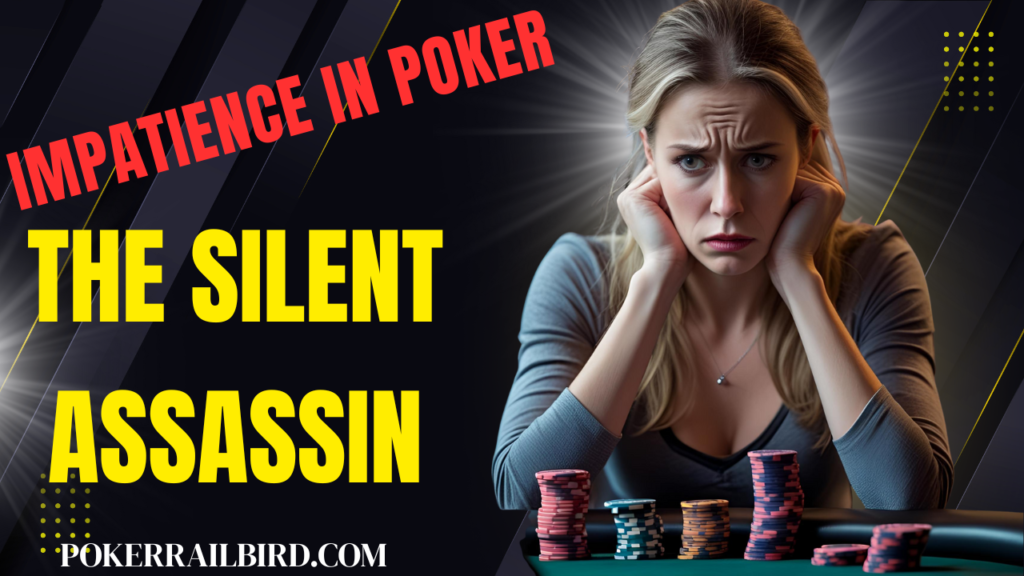DEADLY SIN NO. 3: IMPATIENCE
THE SILENT BANKROLL KILLER
Poker impatience is one of the most common—and costly—mental leaks in the game. Unlike tilt, which is explosive and emotional, impatience creeps in slowly. It whispers to you during long stretches of folding trash hands. It nudges you when everyone else seems to be raking pots with garbage. And before you even realize what’s happening, you’re playing hands you shouldn’t, chasing outcomes you don’t believe in, and stepping outside the structure that once gave you an edge.
Even the tightest, most disciplined players fall victim to this sin. You wait. You fold. Then wait some more. And then finally you think, “Maybe I’ll just take a shot.”
Sometimes it works.
Usually, it doesn’t.
And over time, it chips away at your bankroll—quietly, consistently, and without mercy.
Impatience isn’t just a bad habit. It’s a strategic breakdown. And if you don’t learn to recognize it, control it, and use it as a signal rather than a trigger, it will cost you far more than a bad beat ever will.

WHAT IMPATIENCE IN POKER LOOKS LIKE AT THE TABLE
Poker impatience rarely announces itself outright. It doesn’t throw a tantrum or slam the chips. Instead, it shows up quietly—disguised as boredom, frustration, or a subtle itch to “mix it up.”
Here’s how it reveals itself in real games:
THE SELF-TALK SPIRAL

Poker impatience doesn’t always start with action—it often starts in your head. You fold for an hour and start telling yourself,
“This is BS. I’m folding hands better than what they’re showing at showdown.”
The voice gets louder:
“I’m smarter than these guys. They’re watching movies, scrolling their phones, and they’re winning. Why am I concentrating so hard?”
What started as frustration becomes a permission slip to break from discipline, and it spirals from there.
BOREDOM-DRIVEN DECISIONS
OVERPLAYING MARGINAL HANDS
LOOSENING UP WITHOUT CONTEXT
After folding hand after hand, you look down at Q♦10♠ under the gun and convince yourself it’s “playable.” It’s not a hand you’d normally raise with, but poker impatience convinces you that something is better than nothing.
You start calling raises or making light 3-bets with hands like A♠7♣ or K♣9♦ just to create action. You’re not making a strategic adjustment—you’re just tired of folding.
Your preflop range gets wider and wider, but not because the table dynamic demands it. It’s because you’re forcing the action instead of reading the situation.
PLAYING OUT OF POSITION WITH NO PLAN
LOSS OF MINDFULNESS
You enter pots from early position without a clear post-flop strategy. Then the flop misses, and now you’re stuck. It wasn’t a play—it was a punt.
.
You start checking your phone, watching the TV across the room, or chatting up the cocktail waitress. Then you miss critical hands, showdown information, and even player changes.
“I’ve had players come and go from the table, and I didn’t even notice until much later. That’s pretty pathetic—but it happens.”
These behaviors might seem harmless in isolation, but they’re all symptoms of the same disease: poker impatience. When you catch yourself engaging in any of them, it’s a signal to stop, reset, and get back to your disciplined core.
At the end of the day, my biggest opponent isn’t the loose player three seats down, or even the shark who just sat in. It’s me.
I could be at a table full of pros—Phil Hellmuths, Tom Dwans, you name it—but when it comes to patience, I’m the one I have to beat.
When I lose patience, I’m not being outplayed by them. I’m outplaying myself.
That’s not theory. That’s lived experience. And it’s one of the hardest truths in poker.
THE REAL COST OF IMPATIENCE
At first glance, poker impatience might seem harmless. You play a few extra hands. You take a couple of questionable shots. No big deal, right?
Wrong.
Here’s what’s really happening under the surface:
LOSS OF eXPECTED vALUE
CUMULATIVE LEAKS ADD UP
MISSED OPPORTUNITIES WITH REAL HANDS
Every time you deviate from your plan to “take a shot,” you’re sacrificing long-term profit for short-term emotion. Impatience isn’t free—it’s paid for in future equity.
A few impatient plays per session might not seem like much, but over a month or year, they drain your win rate. It’s death by a thousand cuts.
When you’re stuck from impatient mistakes, you’re no longer playing to win—you’re playing to recover. That changes everything, including how you handle actual good hands.
THE GATEWAY TO TILT
Once you’ve lost patience and dumped a few hundred on low-percentage plays, frustration kicks in. You thought poker impatience was the problem—now tilt joins the party.
And just like that, you’re not playing poker anymore.
You’re spiraling.
What started as a lapse in discipline becomes a full-blown breakdown—emotionally, strategically, and financially.
This is the night you lose more than money.
You lose control. You lose face. But most of all, you lose confidence.
And you mutter to yourself the whole ride home, wondering how it all unraveled so fast.
WHY WE BECOME IMPATIENT
Poker impatience doesn’t come out of nowhere. It builds—quietly—until it pushes us into making a move we shouldn’t.
Sometimes it’s boredom.
Sometimes it’s frustration.
Sometimes it’s just the human need to feel like we’re playing.
But often, the biggest trigger is something far more personal: being card dead.
You sit there for an hour folding 9♠2♦, 6♥3♣, and J♦4♠. Meanwhile, players across the table are raking in pots with hands like K♣3♦ and Q♥7♣. They’re laughing, chatting, scrolling their phones—barely paying attention—and still managing to win. Eventually, that little voice creeps in:
“Why can’t I do that?”
“How bad can this hand be?”
“I’ve folded better hands than what they’re showing.”
And just like that, the pressure builds. You’re tired of folding. You get tired of being left out. You’re tired of playing “right” and watching others get rewarded for playing “wrong.”
That’s how poker impatience starts.
Not with a mistake.
But with a justification.
It’s not about logic.
It’s about entitlement.
“I’ve waited long enough. I deserve a pot.”
And that’s the turning point—when poker stops being a strategy and starts becoming a reaction.
PATIENCE ISN'T PASSIVITY
Many players confuse patience with doing nothing.
But that’s not what real patience is—not in life, and definitely not in poker.
True patience isn’t passive. It is deliberate and purposeful. You are choosing not to act when you know that action would be –EV. It’s folding hands that others play, not because you’re scared, but because you’re sharp.
Patience is a form of control.
It’s a decision. A weapon. A skill.
When you reframe it that way, patience becomes empowering.
Here’s what active patience looks like at the table:
OBSERVING YOUR OPPONENTS
PRACTICING DISCIPLINE
FOLDING WITH PURPOSE
LETTING OTHERS MAKE THE MISTAKES
Use your downtime to study betting patterns, physical tells, stack sizes, and player tendencies. This is free intel—and most people aren’t collecting it.
.
Every disciplined fold isn’t just a hand you didn’t play. It’s a hand where you avoided loss. That’s profit by prevention.
Don’t just toss hands away like they don’t matter. Recognize the equity you’re preserving. Your patience is a form of capital conservation.
Most poker players beat themselves. When you’re patient, you give them room to do exactly that.
The problem with poker impatience is that it fools you into thinking action is always required. But some of the best moves in poker aren’t bets or bluffs.
Sometimes, the best move is no move at all.
THE CHURCH OF REASON INSIGHT
From the Church of Reason perspective, poker impatience isn’t just a leak—it’s a value distortion. It’s what happens when we shift from a structured, logical mindset into a reactive, emotional one.
The romantic mindset wants action. It wants drama. It wants to play the hero. And when you’re card dead or bored, that voice gets louder:
“Make something happen. Do something. You’re not here to just fold all night.”
But the classical mindset—the one rooted in structure, logic, and long-term equity—knows better. It understands that poker isn’t about action. It’s about decisions.

Impatience is value rigidity in disguise.
You cling to the idea that folding is weakness. That playing hands is always better than sitting out. That your value at the table is measured by how often you’re in the pot.
And when those distorted values take over, discipline fades. Poker becomes performance. And results become chaotic.
To be impatient is to deny the structure of the game.
It’s to ignore the form, the flow, the data—and follow a feeling instead.
If the Church of Reason has a core teaching about poker, it’s this:
The structure is there to serve you—but only if you respect it.
HOW TO BUILD PATIENCE IN POKER
Beating poker impatience isn’t about learning to care less—it’s about learning to care differently.
You don’t need to stop feeling bored, or frustrated, or card dead. You just need to stop letting those feelings drive your decisions.
Here’s how to build real, resilient patience at the table:
SHIFT YOUR DEFINITION OF WINNING
USE THE DOWNTIME WISELY
TRACK YOUR RESTRAINT
Start by redefining success. Every time you fold a junk hand and avoid leaking chips, you’ve already won. Patience isn’t inaction—it’s profit protection.
You don’t have to sit there stewing. Pay attention. Watch for patterns. Who’s defending their big blind too often? Who snap-checks the turn with air? Poker gives you dozens of little clues per orbit—if you’re watching.
Most players track the hands they play. Start tracking the ones you don’t. Create pride in your discipline. Remind yourself that folding is part of the process—not a punishment.
RECOGNIZE THE TRIGGERS
TAKE STRATEGIC BREAKS
When you hear yourself saying things like:
“I just want to play something.”
“I’ve folded better hands than this.”
“I deserve to win one.”
That’s not your strategy talking. That’s your impatience taking the wheel. Catch it. Name it. Don’t act on it.
If the boredom is too strong to fight, don’t. Step away. At the next dealer change or once an hour, take a two-minute break. Walk around. Stretch. Reset.
Poker patience isn’t infinite—but it is rechargeable.
Mastering patience isn’t about suppressing the urge to play—it’s about understanding that not playing is often the most powerful move you can make.
FINAL THOUGHTS
Poker impatience doesn’t always show up as a big, dramatic blow-up. Sometimes, it arrives as a whisper. A flicker of frustration. A silent compromise with yourself that says,
“Just play one.”
“Take a shot.”
“It’s been long enough.”
And then you’re in. Then you’re stuck. And then you’re chasing.
The cost isn’t just in chips—it’s in the breakdown of discipline, focus, and self-trust.
It’s the emotional hangover you carry out of the card room and all the way home.
But here’s the truth:
Patience is a skill.
It can be trained. Strengthened. Mastered.
And when it is, it becomes one of the sharpest edges in your arsenal.
Folding is not weakness, nor is is passivity.
Folding is restraint with a purpose.
Because sometimes, the most profitable decision you’ll ever make…
is to avoid making decisions at all – just fold.
.




